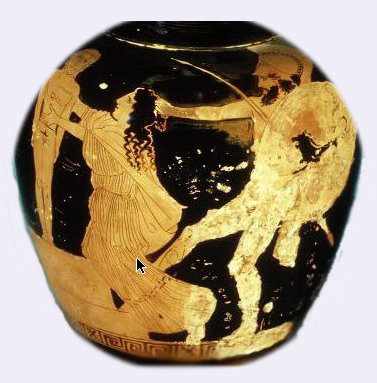Cassandra
A woman's place is in the wrong
Her Story (as opposed to History?): Cassandra or Kassandra (also called Alexandra)
![[Ajax's rape]](kassoval.jpg)
Homer only mentions her twice - once as the most beautiful of King Priam's daughters (Iliad 13) and at the end of the epic, where she's the first to see her brother Hector's body - released by Achilles - being brought back to Troy by her aged father. Her beauty (compared to golden Aphrodite's) gets a second mention - and it's her screams which tell the Trojans that Hector's corpse is home. Tantalising details - but they don't tell us even whether she was a priestess, let alone a prophetess.
By the time of Aeschylus and Pindar (second quarter of 5th century) we can fill out the story: during the sack of Troy, she was abused by Ajax son of Oïleus (the smaller Ajax) - a vase painter of the same period shows her naked and clinging to Athena's statue as the brutal warrior offends religion and modesty by attempting to drag her off (above).
 Another
painting (left) shows her being dragged by the hair, as she tries to reach
the protection of Apollo. In later accounts it becomes a full rape. Finally
she was selected by Agamemnon as his prize to take home - where she was
murdered alongside him by Agamemnon's wife Clytemnestra. Before her death,
in Aeschylus' play Agamemnon, she tells of how Apollo had
seduced her - by offering her his special gift: prophecy. But she changed
her mind and denied him satisfaction. His revenge was to change the gift
subtly - she'd still see the future, but no one would believe her. The
real cruelty was that she would always see the truth: but be unable to
communicate it. So in the play she foresees her own brutal death - as
well as Agamemnon's - but cannot prevent it. It is thus that she appears
in later literature: foretelling an event but being ignored (as in Virgil Aeneid 2, where she knows the secret of the Wooden Horse,
but nobody takes her seriously...)
Another
painting (left) shows her being dragged by the hair, as she tries to reach
the protection of Apollo. In later accounts it becomes a full rape. Finally
she was selected by Agamemnon as his prize to take home - where she was
murdered alongside him by Agamemnon's wife Clytemnestra. Before her death,
in Aeschylus' play Agamemnon, she tells of how Apollo had
seduced her - by offering her his special gift: prophecy. But she changed
her mind and denied him satisfaction. His revenge was to change the gift
subtly - she'd still see the future, but no one would believe her. The
real cruelty was that she would always see the truth: but be unable to
communicate it. So in the play she foresees her own brutal death - as
well as Agamemnon's - but cannot prevent it. It is thus that she appears
in later literature: foretelling an event but being ignored (as in Virgil Aeneid 2, where she knows the secret of the Wooden Horse,
but nobody takes her seriously...)
The beautiful victim - the girl who dared to say no.
Her exceptional beauty is attractive to men and gods - but it's a beauty which is fatal to others, and brings her no happinesss. Both Homer and Virgil have a foreign prince coming to Troy as her fiancé - who then gets killed immediately. This is the penalty she pays for leading Apollo on - she's the worst kind of tease, beautiful, apparently willing, and then saying no at the last moment. In a male culture she deserves a fitting punishment. And so, tit for tat, men will promise her marriage - but death will ensure that there is no consummation. Greek society did not recognise the woman's right to say no: so her fate is, in a sense, to have to accept the answer "no" for the rest of her life. No to marriage, and no to her accurate prognostications. And so she becomes a serial victim who deserves sympathy for her tragic life but gets none. But perhaps modern society can restore her to the place she deserves? Should she not be a heroine for her courage - in exercising her right to say no - even if it was to a god?

